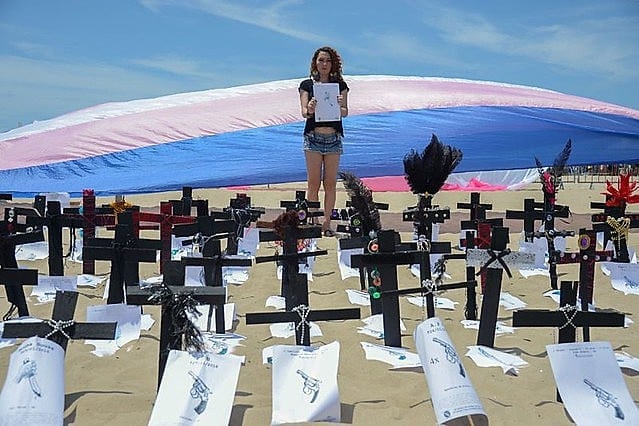Brazil continues to be the world’s deadliest country for trans people, a new dossier published on Wednesday shows.
The report, produced by the National Association of Travestis and Trans People (Antra), revealed reports of 124 cases of murder of trans people in 2019. Mexico, the world’s second deadliest country for the trans community, reported half that number of murders of trans people in the same year.
The Antra is a nationwide network established in 2000 in which 127 organizations carry out actions to promote citizenship for trans people and travestis, a typically South American gender identity describing people assigned male at birth who take on a feminine gender role and gender expression.
Most cases, according to the organization, are reported in Brazil’s northeast, where 45 trans people were murdered last year. But São Paulo, in the southeast, recorded the highest homicide rate by state: 21 murders. Ceará, in the northeast, is the second deadliest state for this community, with 11 reported cases.
Another alarming information revealed by the survey exposes how serious the violence against Brazilian trans people is: 80 percent of the victims showed signs of torture.
The police identified suspects in only 8 percent of the cases.
Bruna Benevides, a secretary for political affairs with the Andra and author of the dossier, points out how important the survey is. This is the third issue of the report.
“LGBTphobia, and especially transphobia, is structural and structured into our society,” Benevides underscores. “So this work is showing people in general that trans people are extremely vulnerable and marginalized, and that focused and urgent actions are necessary to stop this violence and make sure we are able to progress. So that we can be fully included in society, have our autonomy and gender identity completely respected.”
The number of murders reported in 2019 was smaller than in the previous two years. There were 179 reported cases in 2017 and 163 in 2018. Benevides explains that, while the numbers may be decreasing, that does not mean that violent crimes against trans people are dropping. Between Jan. 1 and 24, 2020, for example, the number of reported homicides surged 180 percent over the previous year.
“Does any trans person feel safe in Brazil? When we go out, we don’t know if we are coming back home alive. We don’t know if we will be allowed to access public services or places. Especially right now, when the way society has been reacting to our accomplishments is getting worse, with a very ‘anti-trans’ and ‘anti-gender’ rhetoric and agenda that has been implemented in the government.”
Data disclosed by the organization Gênero e Número show that, last year, the number of reported cases of assault against trans people skyrocketed by 800 percent. Eleven trans people are reportedly assaulted every day in Brazil.
Demographics
The dossier published this week also revealed details about the victims of transphobia in 2019 in Brazil: 80 percent were black and 97.7 percent were trans women.
The Antra pointed out that a trans person is more likely to be assassinated when they are 15 to 45 years old.
The organization’s spokesperson underscores that the survey shows how the Brazilian government neglects the problem. “The country is consistently ranked first in the number of [reported] murders against trans people and nothing has been done. Nothing. Not even surveying these numbers — it’s civil society who does that. Trans people face a specific kind of violence, due to gender discrimination and the very fact of being trans, and that requires specific ways to fight it.”
As trans people are subjected to social and financial vulnerability, and the lack of access to formal jobs, 90 percent of Brazilian trans women work in the sex work industry, where they face many different forms of violence every day. More than half the reported homicides of trans people in 2019 took place on the streets.
Under-reporting
As the Brazilian State lacks the appropriate tools to monitor homicide rates affecting trans people, the Antra points out that the under-reporting of crimes is a big issue. The dossier produced by the organization, for example, gathers information published by news outlets from all over the country.
“Under-reporting leads to lack of data and hides the real numbers. It’s a problem as big as violence itself, because it’s institutional violence, which does not acknowledge LGBTIphobia for its causes, and also overlooks its consequences,” Benevides argues.
The author of the dossier is also concerned that transfemicide — the systematic killing of travestis and trans women — could become an even bigger problem in the Jair Bolsonaro administration.
“When Bolsonaro says that minorities must bow down to the majority, that comes back as hateful reactions against us. That’s directly encouraging acts of violence,” she says, mentioning a statement made by the then presidential candidate during the 2018 elections.
Some cases included in the Antra report were actually of travestis who were murdered while their killers shouted “Bolsonaro.” Similar cases were also reported during the 2018 presidential race, when politically-motivated crimes surged.




